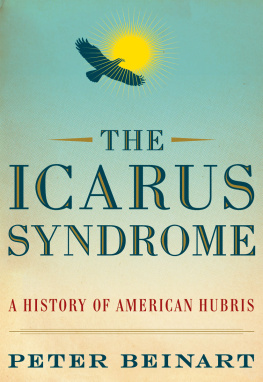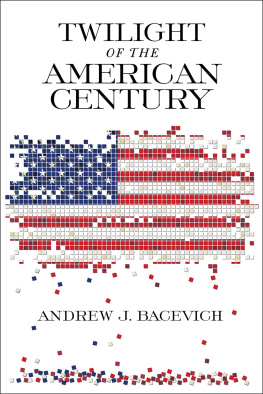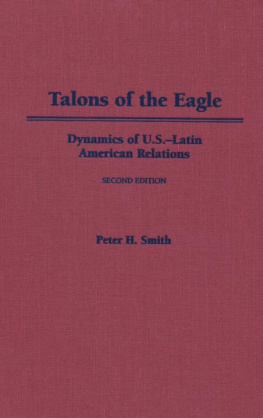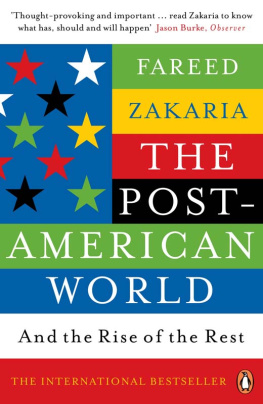If you want war, nourish a doctrine. Doctrines are the most frightful tyrants to which men are ever subject.
W ILLIAM G RAHAM S UMNER
A story: the reason I wrote this book. I was sitting at a restaurant on New Yorks Upper East Side in early 2006, squeezed into a corner table next to an elderly, elfin man sipping a martini. He was Arthur Schlesinger, Jr.; I was petrified. Id hero-worshipped the man since high school, when I developed a bout of Kennedy mania not uncommon among young liberals in Reagan-era Boston. Id consumed his memoir of the Kennedy White House, and his cold war liberal manifesto, The Vital Center , and stacks of his op-eds. I didnt really understand why he was having lunch with me, and as far as I could tell, none of my halting efforts at flattery and political insight were validating his decision. He mostly wanted to gossip, but even there, I was out of my depth.
Then his tone changed: Why did your generation support this war? I began to stammer, something along the lines of Well, of course, not everyone did; they werent all as dumb as me. No laughter. But yes, perhaps there was something in our experience that, on average Then he spilled his martini, and for the first time looked frail. Waiters swarmed; I was off the hook. We never spoke again. Less than a year later, he died.
But as one often does after flubbing a pregnant moment, I kept going over the scene in my mind, trying to formulate an answer worthy of the question and the questioner, something that convinced him I wasnt a fool. His assumption was right: Young people had supported the Iraq invasion at higher rates than their elders. According to an October 2002 Pew Research Center poll, Democrats under the age of thirty were almost as pro-war as Republicans over the age of sixty-five. A survey of bloggers, pundits, and op-ed writers revealed the same generational skew. And the reason, the culpritsuddenly it hit me: One of the culprits was him!
It was Schlesinger, after all, who had written in January 1991 that the Gulf War will most likely be bloody and protracted, that it will be the most unnecessary war in American history, and it may well cause the gravest damage to the vital interests of the republic. He may not have remembered that op-ed, but I did. I was a sophomore in college then, a dove, a worshipper of Arthur Schlesinger. On the eve of the first major war of my adult life, I was looking for guidance, and everywhere I looked, from my professors on up, the guidance was: Dont do it. Remember Vietnam. Tremble when you contemplate war. And so I trembled, and war came, and it was neither protracted nor bloody, at least for our side. In fact, the Kuwaitis greeted us as liberators, and it turned out that Saddam Hussein had been hiding a crash nuclear program, which might have reached fruition had he not been thrashedall of which made me tremble, in retrospect, about what might have happened had we not gone to war.
Then came Bosnia. In 1993, with Bill Clinton trying halfheartedly to convince Americas European allies to support air strikes against the Serb army that was raping and murdering Bosnias Muslims, Schlesinger warned that the arguments used today for intervention in Bosnia have disquieting echoes of the arguments used 30 years ago for intervention in Vietnam. Vietnam! The word made me shiver. But two years later, Clinton did launch air strikes, and then he sent peacekeepers, and there was no quagmire. On the contrary, the rapes and murders stopped. The barbed wire from the concentration camps came down.
Finally, in November 2001, early in the Afghan War, my hero put pen to paper yet again, this time insisting that the Bush administrations effort to depose the Taliban was proving futile. Perhaps, he wrote, they should have reflected on Vietnam. But by now I was sick of reflecting on it. It had never been my war, after all. It was a bogeyman, conjured by well-meaning but patronizing eldersin the way a grandparent who had witnessed the Depression might warn against investing too heavily in stocks. By 2003, when America invaded Iraq, my generation had witnessed its own history, and it was not a history that made one tremble at the prospect of war. I was tired of hearing people cry wolf. Vietnam just hearing it invoked in a foreign policy debate made me roll my eyes.
So I had my answer to Schlesingers question. And I imaginedin that puffed-up way you imagine when youre on a pedestal speaking to yourselfthat he would have been unsettled. And then I had another thought, which unsettled me : My answer wouldnt have surprised him a bit. He had gone through the same process himself. As a college student in the late 1930s, he too had heard his elders invoke a traumatic warWorld War Ias a reason not to fight again. At first he believed them, clinging to isolationism until Nazi troops reached French soil. But then he saw his elders proved wrong: For America, World War II was not a disaster; it was a triumph. And after the war, the triumphs continued. If 1989 through 2003 were our golden years, 1945 through 1965 were his. He too had been a child of the age of victory. And then Vietnam came, and he tasted tragedy, and politically he was never the same.
Now historys wheel had turned again. Another generationminehad seen so much go right that we had difficulty imagining anything going wrong, and so many of us grew more and more emboldened until a war did go hideously wrong. Maybe there was an argument here about cyclesSchlesinger loved cyclescycles of success leading to hubris leading to tragedy, leading, perhaps, to wisdom. Hubris. The word stuck in my brain.
It comes from the ancient Greeks, who defined it as insolence toward the gods. In Aeschyluss play Agamemnon , the great warrior, fresh from his triumph at Troy, strides upon a lush purple robe, even though he knows that purple symbolizes divine power. Angered, the gods withdraw their protection, and Agamemnons vengeful wife hacks him to death in the bath. In another Aeschylus drama, The Persians , a young king, Xerxes, inherits a mighty empire from his father, Darius. From the start, Xerxes is tormented by feelings of inferiority, constantly reminded that Dariuss empire was won at spearpoint / while he [Xerxes] not half the man / secretly played toy spears at home / and added nothing / to inherited prosperity. Determined to surpass his fathers accomplishments, and emboldened by Persias military might, he traverses the holy Bosporus, a body of water humans are not supposed to cross. Once again the gods retract their favor, and Persias enemies massacre Xerxes forces. Upon learning the news, Dariuss spirit rises from the grave to bemoan my son in his ignorance / his reckless youth. Mere man that he is / he thought, but not on good advice / hed overrule all gods.
In Greek literature, people sometimes create their own hubris: Like Agamemnon, they win epic triumphs and thus decide they are more than human. And sometimes, like Xerxes, they inherit their hubris from the triumphs of generations past. Take the legend of Icarus. Father and son are trapped on the island of Crete. But Daedalus, a resourceful man, builds wings of feathers and wax. Dont fly too low, he cautions his son, a lighthearted youth named Icarus, or too high: Keep to a middle range if you can, and dont try to show off. At first, Icarusheeding his fathers warningflies cautiously. But in his exhilaration, he gradually forgets Daedaluss words. As the Roman poet Ovid recounts the story, the youngsters initial fears have been mostly calmed. His confidence now has developed. He wonders what he can do with this splendid toy, what limits there are to his fathers invention. He flaps his wings and rises higherbut nothing bad happens. He figures he still has plenty of margin and rises higher still. Watching from earth, observers assume that this winged creature must be a god. Its exciting, wonderful fun, as he soars and wheels, but he doesnt notice the wax of his wings is melting and feathers are falling out. He has flown too near the sun. The wings crumble, revealing him to be mortal after all. And he plunges to his death, into the sea.









